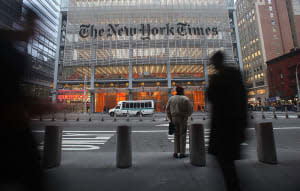The Trump Justice Department also secretly seized the phone records of 4 New York Times reporters last year
- Oops!Something went wrong.Please try again later.
- Oops!Something went wrong.Please try again later.
- Oops!Something went wrong.Please try again later.
- Oops!Something went wrong.Please try again later.

The Justice Department said Wednesday that it secretly seized the phone records of four New York Times reporters last year as part of a leak investigation, the latest revelation of surveilling journalists by the Trump administration. The Biden administration has already informed CNN and The Washington Post that the phone records and email logs of its reporters were secretly obtained last year, a practice that President Biden said is "simply, simply wrong" and will not happen under his administration.
"Members of the news media have now been notified in every instance" where their records were sought in 2019 and 2020 in leak investigations, Justice Department spokesman Anthony Coley said Wednesday. The attorney general has to sign off on requests to secretly obtain journalists' records under reforms implement in former President Barack Obama's second term. William Barr was attorney general for all but the last week of 2020.
"Seizing the phone records of journalists profoundly undermines press freedom," Times executive editor Dean Baquet said in a statement. "It threatens to silence the sources we depend on to provide the public with essential information about what the government is doing."
The Justice Department told the Times it obtained the phone records of four reporters — Matt Apuzzo, Adam Goldman, Eric Lichtblau, and Michael S. Schmidt — from Jan. 14 to April 30, 2017. "The lineup of reporters and the timing suggested that the leak investigation related to classified information reported in an April 22, 2017, article the four reporters wrote about how James B. Comey, then the FBI director, handled politically charged investigations during the 2016 presidential election," the Times says.
The Justice Department started investigating Comey after former President Donald Trump fired him, first focusing on whether his leaked notes on Trump's conversations with him about Russia were illegal, then shifting to whether Comey leaked the existence of the classified 2016 memo. The investigation is still ongoing, the Times reports, though federal prosecutors had concluded by November 2020 that the FBI failed to find evidence to support charging Comey.
